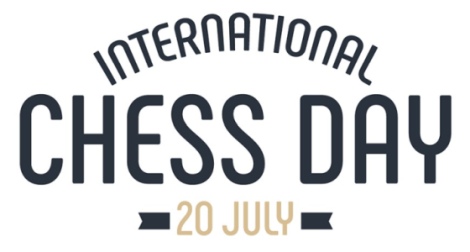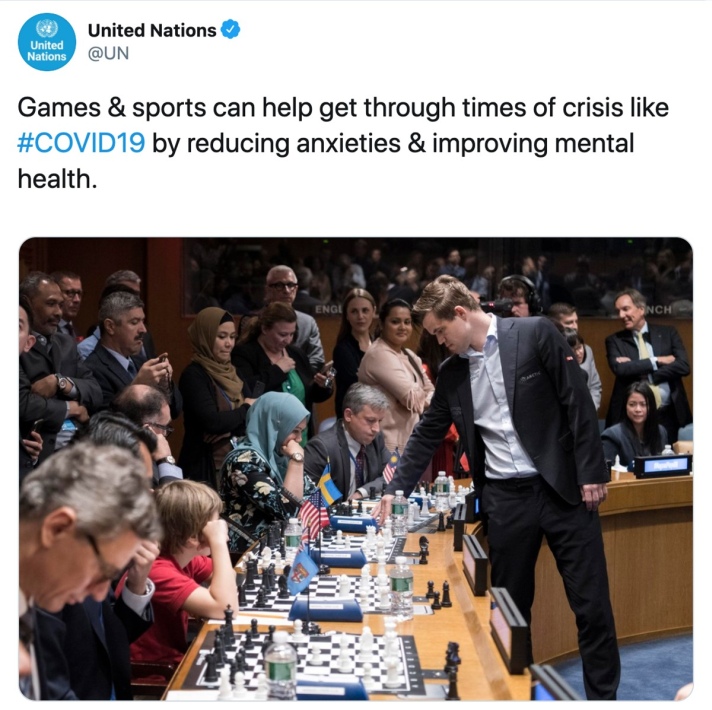The virtual meeting between the United Nations and FIDE on the occasion of the International Chess Day was held on July 20. Top chess personalities and representatives of the U.N. gathered to exchange views and insights to strengthen the productive collaboration.
In his welcoming speech, H.E. Mr. Mher Margaryan, Ambassador and Permanent Representative of Armenia to the United Nations, nodded to the chess movement’s success in Armenia where the game is a part of the schools’ curriculum. “Lessons offered by chess are important in teaching such values as respect for rules and players, fairness, equality, and discipline. Chess is essentially about progress and continuous quest for improvement with effort and decency,” he said.
FIDE President Arkady Dvorkovich thanked the United Nations for their support and noted that “together, we can make chess a tool to improve the world and create better societies.”
Melissa Ruth Fleming, Under-Secretary-General for Global Communications, was very positive about the opportunities that chess brings to communities and individuals. “Today is the celebration of the intellectual game that for centuries has also managed to entertain, to stimulate and sometimes even to confound billions of us over the world,” she said.
Top chess grandmasters present at the meeting, Viswanathan Anand, Hou Yifan, Vladimir Kramnik and Levon Aronian, shared the valuable insights into the abilities and life lessons that chess taught them. Anand dived into the history of chess, while Hou Yifan concentrated on the psychological aspects of the game and women empowerment issues. Kramnik mentioned that scientific studies had proved the benefits of the game for kids.
“No matter how good you are at chess, you are going to lose games. The ability to cope with negative emotions is one of the best things I learned from chess,” said Levon Aronian.
Various issues and aspects of the development of chess were discussed in a friendly and supportive atmosphere. This meeting laid the foundation for further fruitful cooperation between FIDE and the United Nations.

About International Chess Day

FIDE has been celebrating the International Chess Day since 1966, following a recommendation of UNESCO. The date marks the establishment of the International Chess Federation, which was founded during the Paris 1924 Summer Olympics.
On December 12, 2019, the United Nations General Assembly passed a resolution proclaiming 20 July as “World Chess Day”, as per their own denomination. The resolution was tabled by Armenia and co-sponsored by 52 other countries. Armenia’s delegate Mher Margaryan presented chess as a consensus builder that “can transcend national boundaries and break down racial, political and social barriers.”
The impact of COVID-19 on sport
Sport is a major contributor to economic and social development. Its role is well recognized by Governments, including in the Political Declaration of the 2030 Agenda, which reflects on “the contribution sports make to the empowerment of women and of young people, individuals and communities, as well as to health, education and social inclusion objectives.”
Since its onset, the COVID-19 pandemic has spread to almost all countries of the world. Social and physical distancing measures, lockdowns of businesses, schools and overall social life, which have become commonplace to curtail the spread of the disease, have also disrupted many regular aspects of life, including sport and physical activity. This policy brief highlights the challenges COVID-19 has posed to both the sporting world and to physical activity and well-being, including for marginalized or vulnerable groups. It further provides recommendations for Governments and other stakeholders, as well as for the UN system, to support the safe reopening of sporting events, as well as to support physical activity during the pandemic and beyond.
 Magnus Carlsen, during a simul at the United Nations in May, 2018
Magnus Carlsen, during a simul at the United Nations in May, 2018







